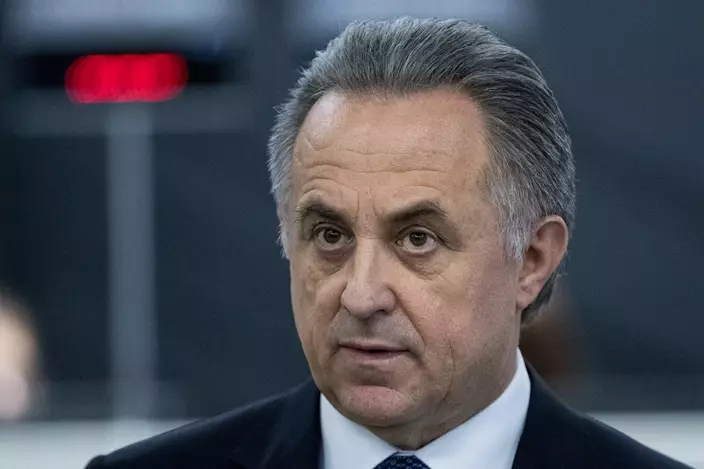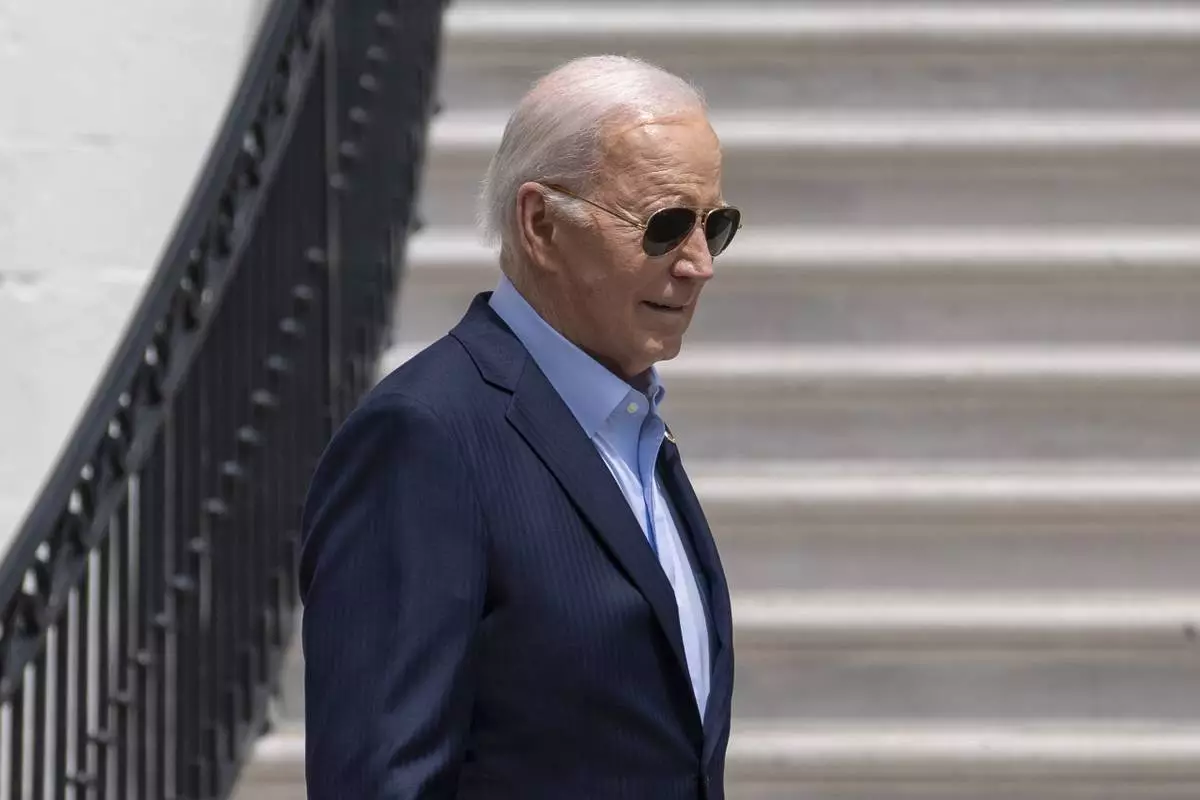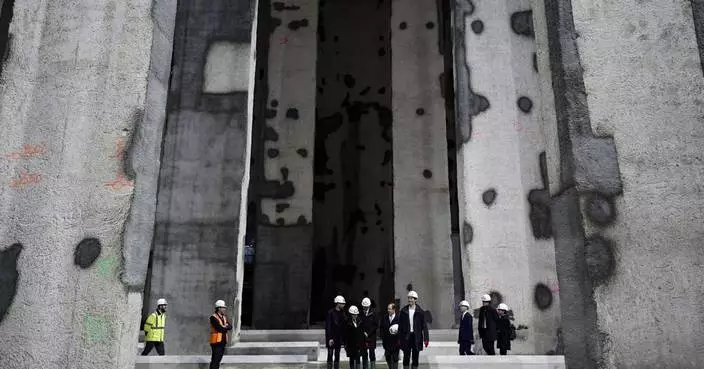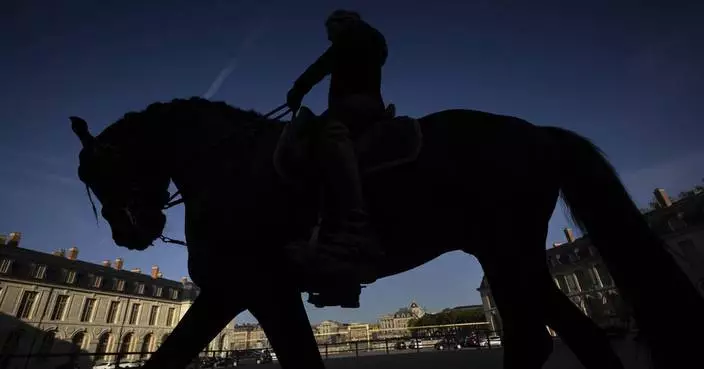Vitaly Mutko bowed to mounting pressure and stepped down as chairman of the 2018 World Cup organizing committee on Wednesday after being dogged by investigations that highlighted his role in a state-backed doping program.
Alexei Sorokin, the chief executive of the committee, will also assume the chairmanship vacated by Mutko. Sorokin also took Mutko's spot on the FIFA Council this year after he was blocked from seeking re-election due to his promotion to Russian deputy prime minister.
The high-ranking government position ensures Mutko will still retain involvement in logistical planning for the World Cup in June and July.

FILE In this file photo taken on Thursday, Dec. 7, 2017, Vitaly Mutko, Russian Federation Deputy Prime Minister & Russia 2018 WCup Local Organising Committee Chairman, speaks with press during the opening of the WCup Fan ID distribution center in Moscow, Russia. (AP Photo/Pavel Golovkin, File)
"Mutko will continue to oversee the preparations of the regions as well as coordinate the construction of the necessary infrastructure," the organizing committee said in a statement that expressed "great regret" over his departure.
Mutko's resignation comes two days after he said he would temporarily step down as president of the Russian Football Union while fighting a lifetime ban from the Olympics.
Investigations by the World Anti-Doping Agency and the International Olympic Committee alleged Mutko was involved in a state-sponsored doping program during the 2014 Sochi Olympics. Mutko, who served as Russia's sports minister during the Winter Olympics, has strongly denied all doping allegations.
The IOC didn't accuse Mutko of being personally involved in doping, but banned him from the Olympics for life, saying he and his ministry bore overall responsibility for "failure to respect" anti-doping rules.
Mutko had been defiant at the World Cup draw in Moscow this month, dismissing calls for him to leave his role as front-man of the tournament.
FIFA, which has faced calls to open disciplinary proceedings against Mutko, did not mention the doping cases in a statement acknowledging the resignation.
"FIFA thanks Mr. Mutko for his invaluable contribution to the preparations for the competition so far," the governing body said. "FIFA will continue to work in close collaboration with the LOC (local organizing committee) under its new leadership as well as with the Russian government, the Russian Football Union and the host cities with the aim to deliver an exceptional event in June and July."
Russia opens the World Cup against Saudi Arabia on June 14 in Moscow where the final will be staged on July 15.
"The change in the leadership ... will not affect the preparation of the 2018 FIFA World Cup," local organizers said.
WASHINGTON (AP) — President Joe Biden has called Japan and India “xenophobic” countries that do not welcome immigrants, lumping the two with adversaries China and Russia as he tried to explain their economic circumstances and contrasted the four with the U.S. on immigration.
The remarks, at a campaign fundraising event Wednesday evening, came just three weeks after the White House hosted Japanese Prime Minister Fumio Kishida for a lavish official visit, during which the two leaders celebrated what Biden called an “unbreakable alliance,” particularly on global security matters.
The White House welcomed Indian Prime Minister Narenda Modi for a state visit last summer.
Japan is a critical U.S. ally. And India, one of the world's fastest-growing economies, is a vital partner in the Indio-Pacific despite differences on human rights.
At a hotel fundraiser where the donor audience was largely Asian-American, Biden said the upcoming U.S. election was about “freedom, America and democracy” and that the nation's economy was thriving “because of you and many others.”
“Why? Because we welcome immigrants,” Biden said. “Look, think about it. Why is China stalling so badly economically? Why is Japan having trouble? Why is Russia? Why is India? Because they’re xenophobic. They don’t want immigrants.”
The president added: “Immigrants are what makes us strong. Not a joke. That’s not hyperbole, because we have an influx of workers who want to be here and want to contribute.”
There was no immediate reaction from either the Japanese or Indian governments. White House national security spokesman John Kirby said Biden was making a broader point about the U.S. posture on immigration.
“Our allies and partners know well in tangible ways how President Biden values them, their friendship, their cooperation and the capabilities that they bring across the spectrum on a range of issues, not just security related,” Kirby said Thursday morning when asked about Biden's “xenophobic” remarks. “They understand how much he completely and utterly values the idea of alliances and partnerships.”
Biden’s comments came at the start of Asian American and Pacific Islander Heritage Month, and he was introduced at the fundraiser by Sen. Tammy Duckworth, D-Ill., one of two senators of Asian-American descent. She is a national co-chair for his reelection campaign.
Japan has acknowledged issues with its shrinking population, and the number of babies born in the country in 2023 fell for the eighth straight year, according to data released in February. Kishida has called the low birth rate in Japan “the biggest crisis Japan faces” and the country has long been known for a more closed-door stance on immigration, although Kishida’s government has, in recent years, shifted its policies to make it easier for foreign workers to come to Japan.
Meanwhile, India’s population has swelled to become the world’s largest, with the United Nations saying it was on track to reach 1.425 billion. Its population also skews younger. Earlier this year, India enacted a new citizenship law that fast-tracks naturalization for Hindus, Parsis, Sikhs, Buddhists, Jains and Christians who fled to India from Afghanistan, Bangladesh and Pakistan. But it excludes Muslims, who are a majority in all three nations. It's the first time that India has set religious criteria for citizenship.
—
Associated Press chief political reporter Steve Peoples and Associated Press writer Aamer Madhani contributed to this report.

President Joe Biden walks to Marine One for departure from the South Lawn of the White House, Tuesday, April 30, 2024, in Washington. Biden is headed to Delaware. (AP Photo/Alex Brandon)











